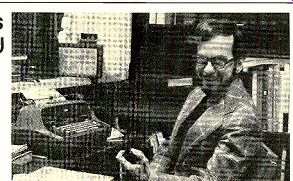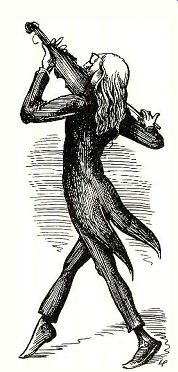
KREMERSPIEGEL
ACCORDING to Herbert von Karajan, Gidon Kremer is the greatest violinist in the world. A signed statement to that effect appeared on Kremer's first American record re lease. the Brahms Violin Concerto (with Karajan and the Berlin Philharmonic), Angel 37226Q. If Karajan is in the habit of tossing around encomiums like this, I certainly had never been aware of it before. That is one hell of a remark to make about a thirty-one-year-old violinist whom most people on this side of the Atlantic had never heard of.
The world is not lacking in outstanding violinists today, young or old. Ten or so years ago the situation was different, and though we had our Oistrakhs, Sterns, Menuhins, Gru miauxs, and others, there seemed to be no large crop of rookies from which the future Oistrakhs, Sterns, et al. would spring. Per haps they were merely overshadowed by the incredible horde of brilliant young pianists, but somehow I doubt it. Consider the scene today, though: Perlman, Zukerman, Chung, Belkin, Fodor, Spivakov, Kim, Oliveira, Milanova (the list is by no means complete), and ... Kremer. All, to my knowledge, are in their twenties or thirties, and ten years ago only one of them (Perlman) was in the record catalog at all, and that with what I believe was his first record. The Milsteins and Sterns are still with us too. So, to call Kremer the greatest violinist in the world today is hardly to say that there is but one swan in the current flock of geese, but to leave yourself open to the most acerbic kind of disagreement that boils down to a comparison of great, great, and great. Nevertheless, Karajan said it, and the result (on my part, at least) was not only an overwhelming curiosity to hear Kremer but also a desire to try to determine what it is about him that might inspire Karajan to such verbal extravagance.
I have now heard Kremer's recording of the Brahms concerto, heard his recording of the Mozart G Major Concerto and the Concertone (Vanguard 71227), heard, courtesy of the Ger man News Company, some of his European recordings of Italian sonatas and other works, and, two nights ago, attended the Carnegie Hall recital he gave with his wife, Elena Kremer, as accompanist. I am reasonably sure I know now what Karajan was talking about.
Kremer is unquestionably unique. He doesn't play like anyone else today, and he certainly doesn't look like anyone else. He is a thin, gangly man who, on stage at least, seems far taller than he really is. He has long blond hair and wears glasses and he seems to drip musicality all over the stage. He was born in 1947 in Riga, Latvia. According to the brief program biography, he comes from a highly musical family, but one doesn't need to be told that in words: the sight and sound of him alone tell you that music is unquestionably his native language.

-------------
Kremer plays a Guadagnini violin that he inherited from his grandfather, and the tone he produces from it is extraordinary. It is not the expected fat, luscious Russian sound, nor does he use a wide vibrato. It is a far more sil very sound which carries beautifully at all dynamic levels and which is remarkably un-abrasive. There is almost no audible evidence that something is being pulled across something else, but rather the feeling that there is at least a half-inch of air between the bow and the string at all times, rather like a violinistic equivalent of Debussy's ideal "piano without hammers." But beautiful sounds alone are not what Kremer is about. Consider his recital pro gram: Stravinsky's Duo Concertant, Prokofiev's Sonata for Unaccompanied Violin, Tchaikovsky's Serenade Melancolique and Valse Scherzo, Stockhausen's (!) Six Melodies from "Zodiac," and Schubert's Fantasy in C Major. The encores were Ravel's Berceuse, a backbreaking movement from one of Ysaye's works for unaccompanied violin, and a funny little piece by a composer named Kupkovich (?) in which the piano harmonically misdirects the violin and the violin keeps bringing in the theme from unexpected notes.
I know of no violinist today who programs this way, nor do I know of one who could have gotten so much out of such a variety of material.
Kremer gave each piece its stylistic due while remaining at all time recognizably Gi don Kremer. The Stravinsky, for example, while never taken beyond the bounds of neo Classicism, emerged with a greater range of expression and of fantasy than I ever knew was in the piece. The Tchaikovsky was soulful enough, but somehow very dignified as well. The Stockhausen was lyrical (within its means) and the Schubert breathtakingly (there were places where everybody stopped breathing) lovely and poised on the knife edge between Classical and Romantic. The Ravel was exquisite and the Ysaye the purest bravura-just to show that he could do it. And the Kupkevich was genuinely funny.
Throughout the recital Kremer's style remained inviolate; not the Russian heroic style, but lyrical-intellectual, cool or warm as the occasion demands, the same style as on his records. Throughout the recital too his technique and intonation were extraordinary (he had a fielding average of about .998, which is fine for a left fielder, not to mention a violinist). Kremer also provided a visual element, for he is the danciest violinist I have seen in years. While never vulgar about it, he does much to make the music visible with a pointing of the toe, a flexing of the knees, or a twist of the trunk. The whole dance is oddly and wonderfully natural; there's not a hint of the prepared act about it, but it conjures up a historical vision and makes manifest still another characteristic of the man and his playing.
FOR perhaps the final fascination of Kremer is that he is in himself-unconsciously so and in the best sense of the term-"theater." As he produces the music he does, as he goes through the steps of his interpretive dance, he is not only a great violinist but the symbol of a great violinist, an Urfigur, the stuff of myths.
His gaunt frame seems to echo every musical soul who played and danced his way through now-vanished towns and hamlets, carrying in him this age-old, peculiar, human condition of musicality, of communication in tones translatable into no other human language. He is a mirror not only of the past but of all human time. Someone should write an opera around him, giving the words to others and to him only the violin and the movement. It should have a mythic title, simply Paganini or Kreisler--or Kremer.
Also see:
Link | --Link | --Link | --TECHNICAL TALK: Fuse Distortion? by JULIAN D. HIRSCH
AUDIO NEWS: Digital Devices, Room Acoustics, Power-amplifier Costs
Source: Stereo Review (USA magazine)